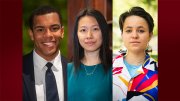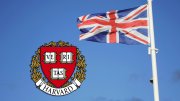The 372nd Commencement exercises on Thursday, May 25, will feature the three traditional student speakers. This year’s orators, selected in a University-wide competition, are Josiah Meadows ’23, Pallas Chou ’23, and Vic Hogg, M.P.P. ’23.
Updated May 25, 2023, 3:35 p.m.: All three student orators’ full speech texts are published here.
Josiah Meadows ’23
Latin Salutatory
When most youngsters go to camp and learn some choice new words, their parents are less than pleased with their expanded vocabularies. But when Josiah Meadows ’23 went away in his age-11 summer, his newfound repertoire included no curse words—at least not in English. At the Academy Vivarium Novum in Rome, Italy, students are only permitted to speak in Latin (or ancient Greek, if they prefer). Despite being the Academy’s youngest student, Josiah was already five years into his Latin studies.
Meadows’s early and robust Latin education came thanks to his parents, who wanted to give him and his four sisters a classical education. “Pretty much everyone that my dad admired had a background in classics, whether it was famous theologians or politicians,” Meadows said. In Meadows’s homeschooling, his father handled logic, humanities, and Latin, while his mother taught science and math. From his aptly-named hometown of Athens, Georgia, Meadows improved his Latin, winning awards for his translations and posting 600 hours of spoken Latin on YouTube. The goal of speaking Latin and ancient Greek, Meadows said, is “not to try to resurrect them,” but to learn them in the same way students learn modern languages.
Although it would have been easy for him to come to Harvard and concentrate in classics, Meadows branched out. “The beauty of Harvard is you can try so many things,” he said. He concentrated in government, which he noted is closely related to classical studies: “Cicero talked about public service as the culmination of the humanistic education, and that’s what I felt drawn to.”
The Winthrop House resident didn’t stop studying Latin, though: Meadows took more courses in classics than in economics, his secondary field. After graduating, Meadows will be following his secondary (despite a planned jab at economics in his Commencement oration) interest by working at a venture capital firm in Greenwich, Connecticut.
Meadows has dreamed of giving Harvard’s Latin address for a decade. When he was 10, his father showed him Harvard’s spoken Latin speech and said, “Maybe one day!” Meadows approached his address the same way he approached his classical studies—with a lot of historical reading. In April, he started reading through old Latin Commencement speeches from the Harvard archives. “It’s just been so fascinating to see this great history,” he said. “It’s definitely become more of a humorous thing, so I’ve tried to find a good balance between keeping that very serious traditional Latin and, at the same time, sprinkling some jokes here and there.”
His speech, titled “The Value of a Harvard Education,” discusses how Harvard students, united in their pursuit for Truth across different disciplines, create lifelong friendships.
Pallas Chou ’23
Senior English Address
As a child, Pallas Chou ’23 exhibited a dangerous degree of curiosity. She garnered a reputation in her Bay Area neighborhood for her ability to ride a ripstick (a two-wheeled skateboard variant) while reading a book. “You just use peripheral vision,” said Chou, “to make sure there are no cars.” Once she got home from her library-enabled antics, she would concoct homemade lipsticks and cleaning solutions. “I would just Google things beforehand to make sure they’re not awful to combine,” she recalled. She loved making toilet cleaner because it was “lower risk” (you just flush it away) and “you can visibly see if it worked or not.”
At Harvard, she tinkered in more controlled environments. A chemical and physical biology concentrator, Chou spent much of her undergraduate time in the lab of Emily Balskus studying enzymes. When Chou speaks about her research, her excitement bubbles over. The Cabot House resident finds the structure of enzymes beautiful, appreciates the ways they work together to make cells thrive, and wants to know exactly how they function: “I think they’re really nifty machines that can do amazing chemistry."
When Chou applied to give an oration at Commencement, she knew she wanted to share her love of these biological marvels. Her speech draws a parallel between enzymes and the Harvard experience, showing how members of the community—all very different individually—work together and form something greater than themselves. She experienced this collaboration during her three years serving on the Undergraduate Council. Through her government secondary, Chou came to understand the scale of her analogy; just as different organelles work together in a cell, she said, the division of labor in a government helps make a school or nation function.
Chou has devoted much of her extracurricular life to CovEducation, a remote tutoring nonprofit she helped launch in March 2020. The group provides free individual tutoring to American K-12 students, specifically focusing on under-resourced schools. Tutors are college students, many of whom receive volunteer hours for university credit or medical school. “I really see the value of education and informing the minds of the future generation,” she said. “There’s a disparity between the ‘haves’ and the ‘have nots’, and it’s been refreshing and amazing to be able to work with people to address this mission.”
Following her interests in both teaching and learning, Chou will pursue a Ph.D. in chemical biology at Stanford. But before resettling in California, she will head to Australia for a week as part of the Quad Fellowship, jointly run by the governments of Australia, India, Japan, and the U.S.
Vic Hogg, M.P.P. ’23
Graduate English Address
For all students, graduating is a tremendous accomplishment. But for Vic Hogg, M.P.P. ’23, stepping up to the podium felt almost impossible five months ago. Late last December, the Harvard Kennedy School student was shot while shopping near their home in Michigan. After driving away from the assailants and calling for help, Hogg thought of Harvard. “I was one semester away from graduating,” they said, worried about dying “before I’ve even done anything.” Hogg suffered a fractured pelvis, could not move their left leg, underwent multiple surgeries, and stayed in the hospital for eight days.
Just weeks after getting shot, Hogg returned to Cambridge for the final semester of their Native American in Public Service Fellowship. In their speech, “The Next Step,” the University’s first non-binary Commencement speaker thanked all of their Harvard peers who aided them this semester and enabled them to graduate. “People came over, they took out my garbage, they took my laundry down, they played with my cats, people fundraised for me,” Hogg said in an interview. “I am able to graduate through the collective efforts of hundreds of people.”
From a young age, Hogg, a member of the Nottawaseppi Huron Band of Potawatomi, recognized the power of community from watching the tribal council support its constituency. “The decisions that my tribal council made to take care of our community,” Hogg said, “have really changed the lives of me, my entire family, and everyone we know in the tribe.”
For college, Hogg traveled far from that familiar community. The resident of Potterville, Michigan (population 3,000), attended Yale and found the transition difficult. Away from home, Hogg “didn’t really know anything about how the world worked.” Hogg studied psychology and thought about pursuing a Ph.D. until a mentor told them it seemed they were “in this for the people” and should consider a career in policy. After graduating in 2017, Hogg spent three years working in youth leadership development in San Francisco before moving to Brooklyn and distributing food to people in need during the pandemic. Through those endeavors, Hogg enjoyed “empowering people to see the possibilities for their lives.”
Coming to Harvard, Hogg wanted to advocate for indigenous, queer, and transgender communities but realized they were missing a lot of skills. At the Kennedy School, Hogg has learned about the practical side of activism: “Change as we think about it winds up being these micro actions.” Next, Hogg hopes to work “at the intersection of conservation, land, and indigenous governance.” Once they have healed more, emotionally and physically, Hogg would like to pursue “a dream of going back to Michigan and working in some way to support Michigan tribes and stewarding lands and the lakes.”









